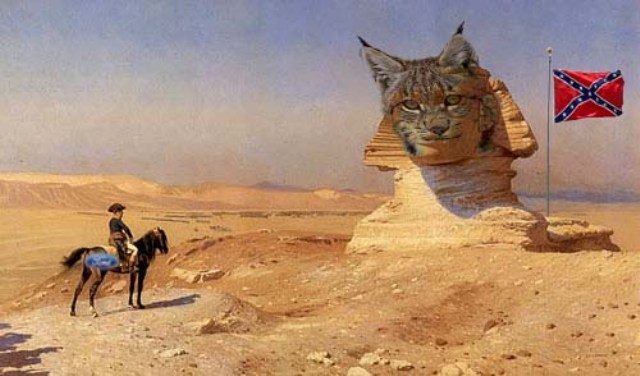The Friday Sphinx
Among the documents salvaged from Bloomingdales’ ship, the HMS Dinghy, many paintings of his adventures adorn the captains’ quarters. Somehow they managed not to be spoiled by the water, and experts are studying them carefully as to discern any hidden meanings. This particular painting appears to depict Bloomingdales’ time in Egypt.
April 28, 2015
Recent findings of historical documents dating from the early Age of Exploration offer new insight into the European documentation of the New World. These documents were uncovered from a shipwreck discovered last week off the coast of an unnamed island in the south of the Arctic sea. The HMS Dinghy, as the name on the hull suggests the ship was called, contains the long lost records of Sir Benedict Worcestershire Bloomingdales III, esquire. The formerly unknown explorer and his equally obscure rivals from various European nations appear to have discovered various landforms and civilizations before most other mainstream explorers ever dreamed of leaving their mother nations. As documents are uncovered and Bloomingdales’ atrocious handwriting is translated into actual English, more and more information is revealed about the adventures of Bloomingdales and his opponents, and the information is jarring. Traditional history is no more, for with these discoveries, what we think about European exploration can ever be the same.
[The following is an excerpt taken from one of the personal diaries of Sir Benedict Worcestershire Bloomingdales III, esquire. It is dated around 1449 CE.]
Captain’s log, stardate March 7th, 1449. Our destination is the luscious jungles of Canada rumored to be in the mysterious land of Antarctica. Temperatures are climbing and I’m certain that we are headed in the correct direction. Despite the unfortunate loss of our compass due to an incident involving my associate Bo, half the ship’s liquor supply, and an oar, my spidey senses are tingling and seem to be carrying us to our destination.
I met Bo during a visit to Nubia in which I was attempting to establish a presence for the mighty nation of England. The locals laughed me off, however, and for some reason that I could discern, they did not think I was a genuine envoy from England. As I was dejectedly slumping around the Nubian port, I encountered a part of town filled with people speaking in strange, thick accents and flying flags that they called “confederate flags.” I found Bo there, sitting on the back of his Chevy carriage and cleaning his guns while discussing with a fellow Nubian man “The War of Egyptian Aggression.” Upon approaching him, I learned that he would be very glad to join me on my expedition around the world, searching for vast, undiscovered treasures and lands to claim for England. I remember his words to me: “There ain’t no way Pharaoh Bama can restrict my gun rights if I’m out on a boat. I can do sum fishin’ while I’m out there, too.”
After this encounter, I went to see some of the land marks Egypt had to offer whilst I contemplated my wretched misery that the Egyptian officials would not take me seriously. A local pointed me in the direction of some large buildings that they called pyramids. These “pyramids” were large, triangular shaped structures that clearly were used as headquarters for the Illuminati. Everyone denied it, claiming they did not know who or what that was. My suspicions rose higher every time I questioned someone on the presence of the Illuminati in these buildings, and they simply told me, “I don’t know what that is.” These suspicions were quelled, however, when some friendly lizard men in tuxedos and dark sunglasses told me that the pyramids were simply there for aesthetic purposes, and there was definitely no worldwide conspiracies housed there. They gave me some funny tasting drink and showed me the way back to my boat.
After an extended nap after which I could not remember anything, I decided to take a leisurely stroll through the streets of town. I disembarked and set off from the pier, intent on taking in the sights. Before I got far on the dusty main road, however, I was introduced to another fascinating facet of Egyptian culture. A faint buzz was growing in the background, and, for the life of me, I could not figure out what it was. As I was inspecting some local goods at a vendor, he stood up, kicked over his miniature statues of the Eiffel tower, and sprinted away up the narrow street. All around, people began doing the same, knocking over their 100% guaranteed local goods and rudely screaming “DUDUDUDU DU DUDUDU DUDUDUDU DU DUDUDU.” I picked up a bobble head figurine of the Pope and only had the chance to read the words “A local hero” etched across the bottom before I was broadsided by Bo. He shouted,
“Run while ya can! It’s da rude sandstorm!” I looked up the street and lo and behold, a sandstorm cometh. The sandstorm whirled with a techno beat and pulsated wildly, which was only amplified by Egyptian townspeople screaming their constant DUDUDUDUDUs. People did not tarry; they cleared out of the roads as quickly as they could. Bo grabbed my arm and hoisted me into his Chevy.
The rest of the incident was a blur. Dazed by the impact of my head against the side of the carriage and the rude sandstorm raging around me, I groveled unintelligibly in the bed of the carriage (or so Bo tells me) and asked to be returned to my mother. Bo also tells me that he saved my life from raptors during this escapade, by which I can only assume means velociraptors. These sands contain far more dangers than I first thought. Immediately after learning this, I lifted anchor and set out once again, while Bo raised one of his confederate flags on our mast. My experience with the hostile environment has led me to realize that perhaps I had not failed in my initial attempt to establish trade with the locals; rather, it was a sign that I should take my business elsewhere. With a trusty companion like Bo aboard the HMS Dinghy, I feel that I am much better off now, and will be able to bring glory back to England with different means.
[End excerpt. A note should be made that there is an illegible page after the previous one that appears to have been smeared with marmalade.]




